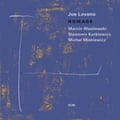In recent years, Australian composer Lance Gurisik has scored various short films and TV shows, written high-profile advertising jingles and soundscapes for an audio design agency called Song Zu, and produced dance music under the name Lancelot. Under his own name, he makes instrumental music that blends the highbrow influences he absorbed while studying at Sydney Conservatorium of Music.

Last year’s album Cull Portal mashed together modal jazz, electronica and densely written orchestral modernism – Keith Jarrett and Philip Glass meets Aphex Twin, if you will. On this follow-up, all these styles feel discrete, like a very high-quality multi-artist compilation. Glut explores Terry Riley-style minimalism, as repetitive marimba lines are woven with synth flourishes and brushed drums; Desinence embraces Tangerine Dream-style electronica; Balance is a galloping waltz, a percussive modular synth playing a series of arpeggios that gradually mutate, both harmonically and in timbre. There are also several flirtations with broken beats, such as the 4hero-style gentrified drum’n’bass of Prednisone.
Most heart-rending are the orchestral tracks. The opener, Stasis, is an edgy miniature that mixes growling double basses, breathy flutes and glittering violins. The closing title track features a barrage of dramatic, shimmering orchestral drones. Bestis Changes, a gorgeous series of slurring, unresolved string lines that some enterprising film producer should snap up immediately.
If there’s a criticism, it’s that these tracks are often so disparate that the album resembles a taster menu. You’d happily want to hear Gurisik create whole banquets in one particular style: be it densely arranged pastoral music for strings, ambient minimalism or darkcore jungle.
Also out this month
Lehto/Korpi (released 30 August on We Jazz) sees Pauli Lyytinen multi-tracking himself on tenor, soprano and alto saxes, harmonising and improvising over field recordings made in the countryside of his native Finland, along with dense choral arrangements played on a mellotron. What could, in theory, be a piece of new-age whimsy quickly mutates into an ecstatic piece of spiritual jazz that appears to reconstruct an alternate Nordic forest. Swiss bassist Martina Berther makes haunting sounds from her bass guitar using unorthodox techniques – rubbing other instruments against its strings and preparing it with clips and mutes to create eerie harmonics. Bass Works features 12 otherworldly improvisations, while Brass Works sees Argentinian artist Vic Bang sampling the original album and using it as the basis for several pieces of rhythmic electronica. And the second LP by Krononaut, Krononaut II (Palomino), is effectively a live duet featuring FX-laden guitarist Leo Abrahams and drummer Martin France, a compelling and highly textural series of improvisations drawing from post-rock, free jazz and the “cellular repetition” of Morton Feldman.
Source: theguardian.com


